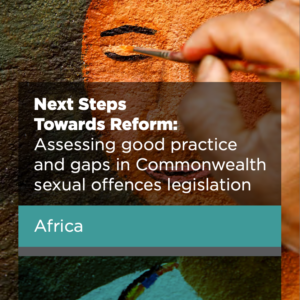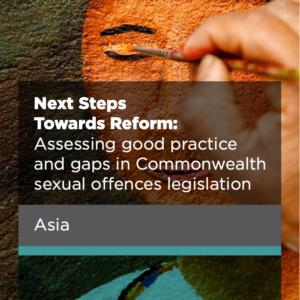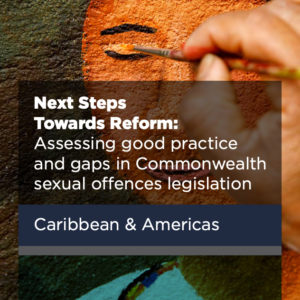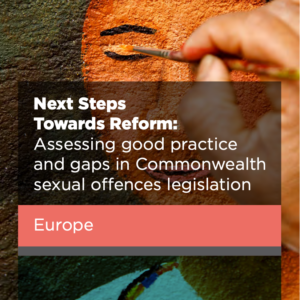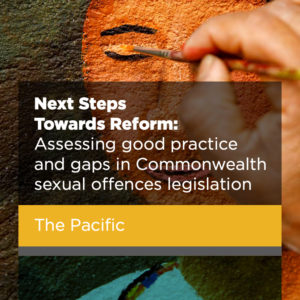This research is intended primarily for use by government officials interested in reforming their country’s sexual offence laws, law reform commissioners and experts, and activists, academics and advocates seeking reform in their country or region. Those working on sexual offences law reform in their country can use this research as a starting point in the law reform process.
The tool is divided into five parts.
-
- All data contained in the assessment, including how each country performs against each indicator.
- Country level assessments, illustrating in detail how an individual country performs against the indicators, including further detail on ratings where appropriate.
- Indicator level assessments, illustrating to extent to which each individual indicator is met across all Commonwealth countries, including a more detailed description of how each indicator is assessed.
- Comparison by country, allowing a comparison of the performance of up to four countries against all indicators.
- Comparison by indicator, allowing an at-a-glance view of how up to two indicators compare across all Commonwealth countries.
In many places across the tool, data is viewable either as an infographic or as a table. These different views are accessible by using the button on the left of the screen.
Across the research ratings are used to illustrate at a glance which aspects of a country’s sexual offences laws meet the good practice standards and which ones fall short of those standards. Where necessary for clarification, short explanations are included. The assessments use the following designations:
 |
The law meets the indicator. An explanation may be provided. |
 |
The law partly meets the indicator. An explanation is provided. |
 |
The law does not meet the indicator. An explanation may be provided. |
 |
No evidence. There was insufficient information available to assess the law against the criteria. |
 |
Assessment not applicable in this jurisdiction |
 |
Multiple jurisdictions. Where a country has multiple jurisdictions, which have been assessed separately and which perform differently against the selected indicator. A full assessment can be accessed at the state level. |
More detailed comments and explanations regarding the reasoning for a particular rating are available throughout the tool, either by clicking on the rating in infographic views or on the Details drop down in table views.
Terminology
The research uses a number of terms with the following meanings.
-
- Accused refers to the defendant in a criminal trial for sexual offences.
- Complainant refers to the victim/survivor of a sexual assault in a criminal trial.
- Good practice not ‘best practice’ is used in this report. Laws assessed as meeting the good practice criteria in this report meet fundamental international human rights standards. Good practice requires, at a minimum, that laws be compliant with these standards. As reform is an ongoing process and standards evolve over time, and there may be different models of legislation that are nonetheless all human rights compliant, we refer to ‘good practice’ laws rather than ‘best- practice’ laws.
- LGBT+ refers to lesbian, gay, bisexual, transgender and other gender non- conforming people and includes people who do not identify with any gender.
- Person with disability includes any person, adult or child, with a permanent or temporary impairment that affects their cognitive, intellectual, hearing, vision, mobility or other capacities.
- Sexual assault includes all non-consensual penetrative sexual assaults, such as rape, unlawful ‘sexual intercourse’ or ‘carnal knowledge’, or however described in law, as well as non-penetrative sexual assaults such as touching or groping.
- Same-sex sexual activity refers to any and all sexual acts between people of the same sex or gender.
- Victim/survivor refers to any person who experiences sexual assault, including persons killed as a result of or as part of the sexual assault. The term recognises some victims/survivors prefer one term over the other to describe themselves.
This research and the information it contains is provided for general informational purposes only. It has been prepared as a work of comparative legal research only and does not represent legal advice in respect of the laws of the jurisdictions of the member countries of the Commonwealth. It does not purport to be complete or to apply to any particular factual or legal circumstances. It does not constitute, and must not be relied or acted upon as, legal advice.
Every effort has been made to reflect accurately each country’s laws based on legislation that was publicly available online or provided to the authors at the time of publishing and, wherever possible, advice from legal experts in the countries covered in this report.
Please report any errors to the Human Dignity Trust at: administrator@humandignitytrust.org.

